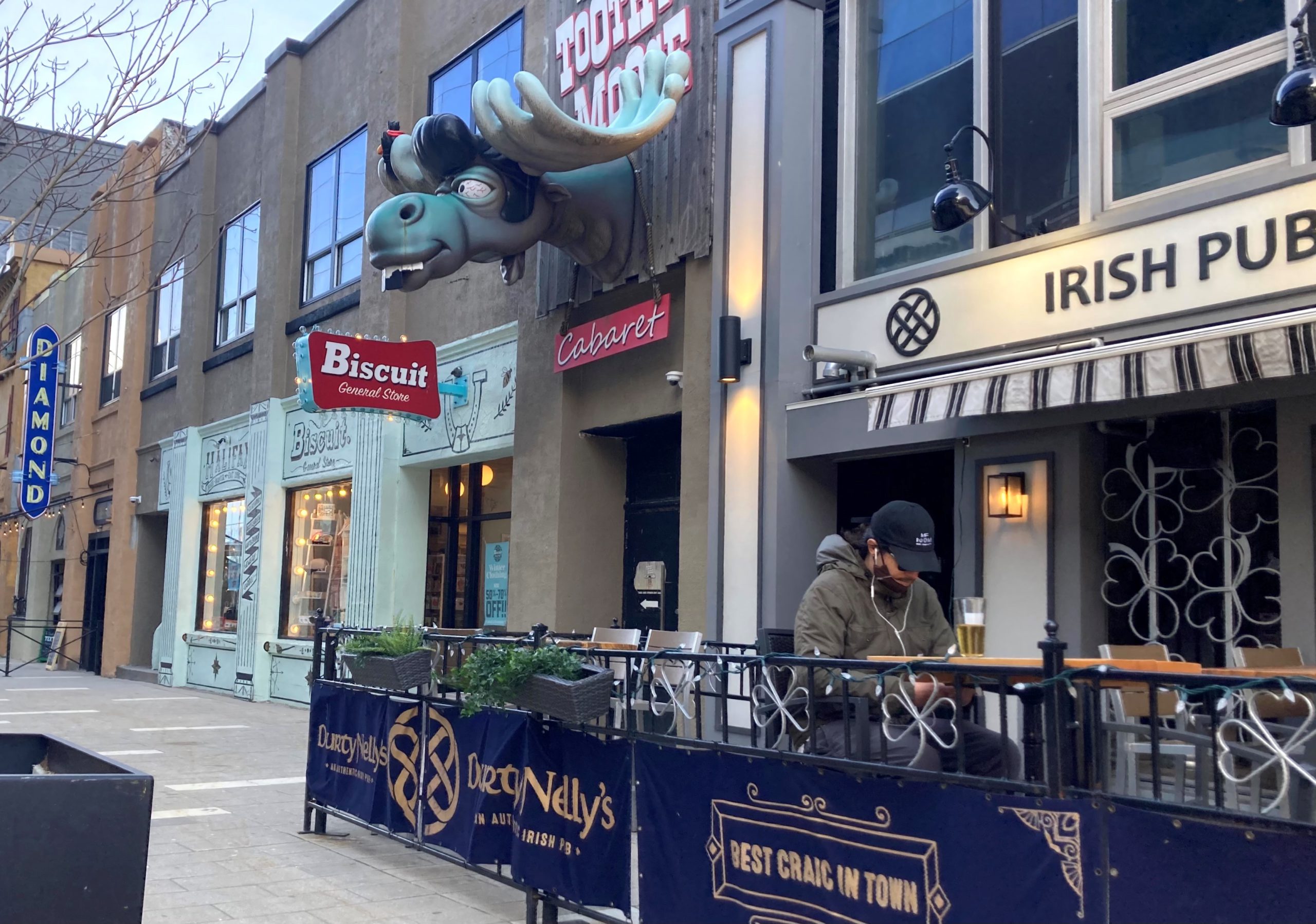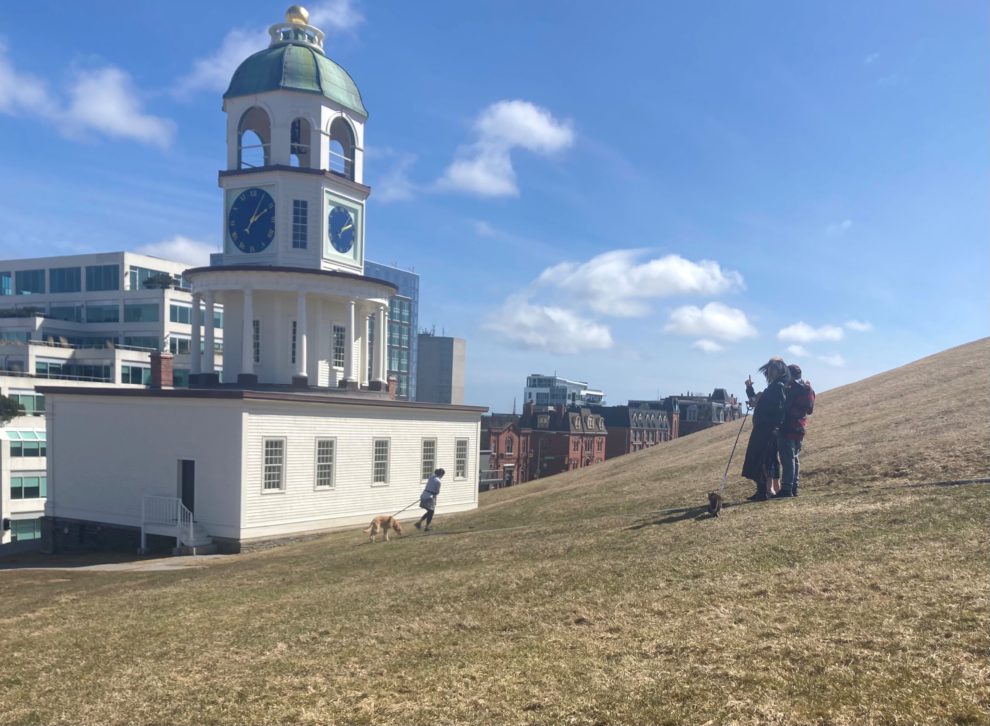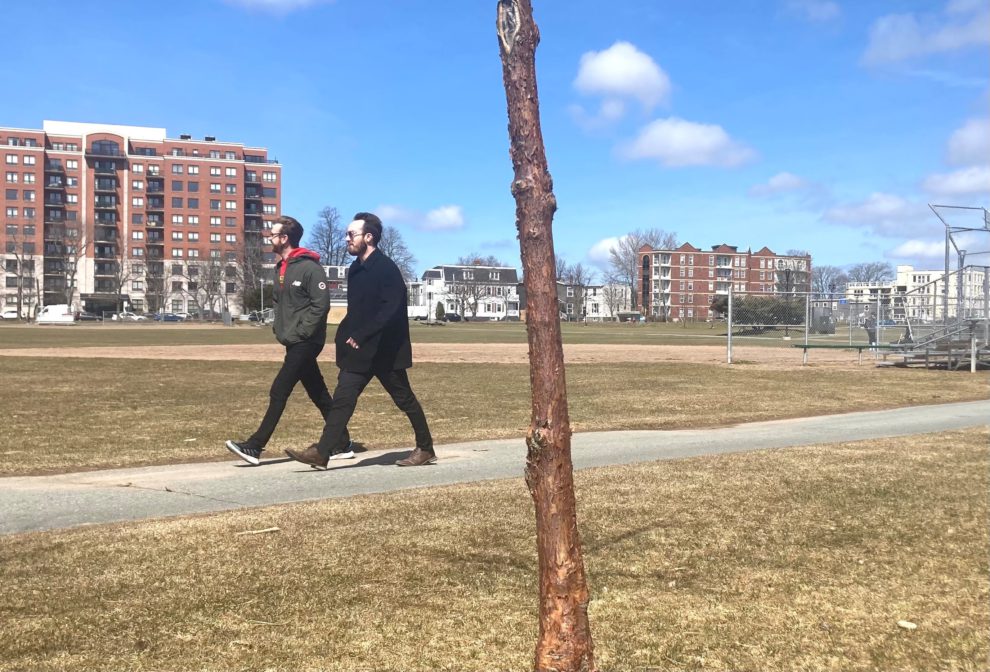Eased public drinking rules in Canada spark conversation in Halifax
Some say relaxing public drinking laws could curb irresponsible drinking, help businesses

caption
A patron at Durty Nelly's pub on Argyle Street in Halifax enjoys a glass of beer on March 31, 2021. Depending on if the province decides to loosen public liquor laws, patrons might not be required to stay inside that fence to crack a cold one.After several cities in B.C. adjusted their public drinking laws last summer, one Nova Scotia man is advocating for rules to be eased in Halifax.
In early March, while chatting with his brother who lives in Paris, Halifax native Al Littlefair first became aware of how relaxed public drinking laws in that city were. There, people can drink legally while strolling down a sidewalk, park or other places.
That conversation got both of them thinking about laws around public consumption of alcohol in Halifax compared to those in Paris.
“People were enjoying a glass of wine or a beer on the street and there was no stress to it. (My brother) was dumbstruck in the moment,” Littlefair said. “He was thinking, ‘Why can’t we have this?’”
Littlefair launched the Twitter account @cuitous in mid-March to discuss public drinking laws in Nova Scotia with others and to examine how relaxed laws could benefit local businesses after the pandemic. Engagement from his tweets included a conversation with Halifax Coun. Waye Mason on the issue, plus comments from locals.
🍻@WayeMason! Who do I have to tweet at to get public drinking legalized in halifax for this summer?!?! #SmallBusiness #cheers 😘
— Sir Cuitous (@cuitous) March 21, 2021
“Places I have travelled where it is legal to drink in public, I haven’t seen a problem and people follow the rules. Don’t use glass containers and be done with it,” said one user in response to one of Littlefair’s tweets.
Littlefair used Argyle Street as an example of how designated public drinking areas might be beneficial.
“I could imagine Argyle being a designated drinking zone, it’s nothing but bars,” he said. “You could have huge lineups waiting to get a (bar) table because you need a table to get drinks. Why couldn’t people buy a beer and walk out into the street and enjoy the atmosphere Argyle has? For businesses, it could reduce the issue of seating capacity.”
Consuming alcohol in public areas like parks is illegal in Nova Scotia, punishable by a $467.50 fine. But recent pilot programs in B.C., plus relaxed laws in Quebec and other places around the world, raise the question of whether exceptions could be made here.
Matt Rogers, president of Bishop’s Cellar wine store on Lower Water Street, said relaxed laws could not only create a possible sales boost. They might also make it easier to police issues like public intoxication.
“There are laws in place like disorderly conduct that I feel would deal with issues coming from public consumption,” he said. “If someone’s behaving responsibly and not disturbing others, then having a glass of sparkling wine on a bench overlooking the harbour shouldn’t be an issue.”
Places that I have traveled where it is legal to drink in public, I haven’t seen a problem and people follow the rules whether Vegas, Savannah or Saigon. Don’t use glass containers and be done with it. Bring back Mardi Gras on Argyle while you are at it.
— Parler Vous Francais (@One1970The) March 21, 2021
Quebec has Canada’s most relaxed public drinking laws. Residents of legal drinking age may drink in public parks if consumed with a meal. These laws are under provincial jurisdiction. In 2020, pilot projects saw several B.C. cities⎼including Vancouver, Penticton and Port Coquitlam⎼permit drinking at designated parks and beaches during certain hours in the warmer months.
The Department of Finance and Treasury Board, which oversees provincial liquor laws, couldn’t provide an interview on the matter. However, a spokesperson did provide an emailed statement.

caption
Although many people enjoy their choice liquors on a nice day on the hill despite Nova Scotia law, the Citadel could be a candidate as a designated consumption area should the rules ever change.“Any policy changes of this nature would require consultation and legislative amendments. At this time, no changes are planned,” spokesperson Tracy Barron said on March 30.
Permitting public drinking without the need for special permits would require consideration of which spaces would allow for it.
Sara Ross, a professor at Dalhousie University’s Schulich School of Law, researches the use of public spaces for various activities in her work and has studied the Vancouver pilot. She said jurisdictions must be careful when expanding drinking areas beyond parks and beaches.
“If you have an area where you’ll be allowing public consumption of alcohol, you have to look at where sensitive populations are,” Ross said.
“Do you have a school or a day care (nearby)? Do you have a shelter? Do you have a church? Generally, the model is you’d want to consult the public, then there might be some pushback depending on who stakeholders are.”

caption
Two parkgoers strike up a conversation strolling through the Halifax Commons on March 31, 2021. In Paris, opening a bottle or can of any alcohol in this situation is perfectly legal, while doing the same here warrants a fine of almost $500.With people often drinking at beaches and elsewhere despite laws, Ross said legalization could enable a jurisdiction to better regulate underage drinking and other issues that hinder responsible consumption.
“Without a program, (Vancouver) didn’t really have a way of enforcing what is legal. A lot of the development for the pilot came from the fact this was happening anyway and when you can regulate it, you can determine who can consume and how,” she said.
Rogers said he believes public drinking laws, if implemented correctly, can help promote responsible–not disorderly–drinking.
“As we continue to develop a responsible culture around alcohol in the province, I think over time we’ll see things evolve and see regulations change,” he said. “(How well) laws work is ultimately with the consumer and how they are able to enjoy or consume.”
Littlefair said although Halifax may not legally allow public alcohol consumption like Paris any time soon, it’s worth exploring public spots in the province that could be well-equipped for safe and responsible drinking.
“Ideologically, drinking could be like smoking, since it’s fair to restrict it in most places,” Littlefair said. “For any laws to be that loose would be way down the line, but having legalized zones or any loosening of the laws would be a step in the right direction.”
Correction:
About the author
Luke Dyment
Luke Dyment is a Halifax-based reporter from Prince Edward Island. He has written for the Globe and Mail, The Signal and the Dalhousie Gazette....

D
Delphine du Toit
J
Jim Watt
M
Mr.T
N
Nelson Larson
D
Danny Brophy